Champions of Change Blog
My parents couldn’t earn sick days. Now I’m making sure everyone in New Jersey can.
Posted by on April 24, 2015 at 12:43 PM EST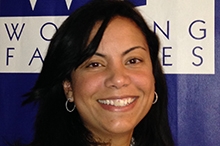
Analilia Mejia is being honored as a Working Family Champion of Change
In New Jersey, 1.2 million workers are unable to care for themselves or their family when illness strikes. This creates an impossible situation for the parent who faces a shortened paycheck and a sick child who should be cared for at home. It also hurts local economies, because every shortened paycheck means groceries left unpurchased. And it threatens our public health when a sick worker feels forced to come into work.
As a child, I often watched my parents make that impossible calculus: care for my sister and myself or make the mortgage payment that month. Take my grandfather to the doctor, and risk a smaller paycheck, or push an appointment back. This issue hits home for far too many in my home state of New Jersey. Medical care goes unsought and illness is spread unnecessarily.
All of this can be prevented with a simple policy that allows all workers to earn time they can take when the inevitable happens.
Two years ago, advocates across New Jersey decided it was time to tackle a problem that plagues far too many workers, particularly those who are most vulnerable due to low wage work, or at the forefront of public health in the service sector industries.
Our strategy is simple: bring the fight to local voters, and show state legislators that the policy works and the voters stand behind it. In September 2013, Jersey City became the first city to pass an earned sick time law. The bill included a call for a study, which researchers released last week. It proves that productivity actually increases for employers as a result of mandated compensated earned sick day policies. In 2014, five New Jersey municipal councils passed identical earned sick time laws. Each of these victories helped build momentum towards a statewide bill, and in fact led to New Jersey Assembly and Senate leadership announcing their renewed support for the legislation and advancing the state bill through the legislative process.
Next, we set out to prove that local voters had a strong appetite for the proposal. In November of 2014, we placed the question on the ballot in two municipalities, where it garnered 75% and 86% of voter support. Because of our strategy, more New Jerseyans are better informed on the policy, elected officials now view it as a critical issue for their constituents, and advocates have local data to show that we all do better when workers have the ability to care for themselves and their families and still make ends meet. These victories have also made a meaningful difference in the lives of over 150,000 workers across our great state who can now breathe a little easier when illness strikes.
With President Obama’s leadership, we hope to make earned sick days a reality for all Americans.
I feel honored every day to lead New Jersey Working Families, and continue to fight to bring equity and fairness for all working families across this state. We fight for a New Jersey in which democracy matters more than corporate money, in which workers make a family sustaining wage and in which the decisions of public officials reflect the values and priorities of the voters who elected them. I do this work not only for the millions who make this state great, but also for the child I used to be. I wasn’t able to help my parents grapple with the struggles that low wage work and poverty created for them, but I sure can help ease those struggles for others today.
Analilia Mejia is the Executive Director of the New Jersey Working Families Alliance, a statewide nonpartisan organization that seeks to promote and defend the interest of New Jersey’s working families.
Learn more aboutKids: Our Best Product – Participating in the Champions of Change for Working Families event at the White House
Posted by on April 24, 2015 at 12:40 PM EST
Rose Marcario is being honored as a Working Family Champion of Change
It’s an honor to be recognized by President Obama for our commitments to working families. I share this gratitude with Malinda Chouinard, who has always made Patagonia a great place for families, and with Anita Furtaw, who developed an award-winning on-site child development program for our Ventura headquarters 30 years ago, and has run it ever since.
We’re happy to serve as a model for other companies who want to do the right thing by their employees. It’s a necessary element of doing business in our time. To support our families, Patagonia provides company-paid health care and sick time for all employees, paid maternity and paternity leave, access to on-site childcare for many employees, and financial support to those who do not have access, among other benefits.
I came to Patagonia in 2008 after working in businesses where I had to relegate my own desire for social and environmental change to nonworking hours. It was my hope, in coming to Patagonia, that I’d be able to engage my whole self as a person and a citizen in my workaday life. But I was also skeptical. I wanted to see for myself whether the company’s values were possible to live by in a competitive business.
Patagonia’s child-care program was my first visible proof of this possibility and it is still—despite all our work to improve social practices and reduce environmental harm in the supply chain—the most striking.
Some benefits of onsite childcare are obvious. The children are lively, curious and happy. As Anita Furtaw has said, “When kids are in the same place and have the ability to trust the adults around them to love them and care for them, they have the energy to do what they need to do in all areas of development. They become more articulate and tend to have higher self-esteem.”
The benefits to the parents and grandparents are also visible: they can see, and be with, their kids during the day and have an engaging work life without sacrificing their lives as parents. Our program also includes traveling caregiver support for those with kids less than a year old.
One benefit is less obvious: the presence of the children transforms the workplace into a community for all employees. The kids and the sounds of their laughter are reminders that it is the purpose of work to honor our human as well as our business responsibilities.
Business results from these investments are significant. For example, employee turnover costs companies up to 150 percent of the base salary of the person exiting. An astonishing 43 percent of women with children leave careers or take extended time away from work after having kids. At Patagonia, nearly all employees return to work after a standard parental leave.
After more than 30 years, we’ve begun to hire quite a few kids who grew up with us. And Anita Furtaw, a tireless champion for our employees and their kids, recently laid the groundwork for a similar center at our facility in Reno to support 400 additional employees.
We face so many challenges today as citizens and businesspeople. In a changing world, it’s vital to be an agent of change—and to have that capability in the workplace as well as in private life. I’ve been able to realize that possibility at Patagonia, where I can put my heart and soul into my work. The credit goes, in part, to the kids of my talented colleagues who keep us all grounded. Any business that wants that commitment from its people should take note—and follow suit.
Rose Marcario is the President and CEO of Patagonia, Inc. and Patagonia Works.
Learn more aboutWorking matters. Families matter. Paid sick days matter.
Posted by on April 24, 2015 at 12:34 PM EST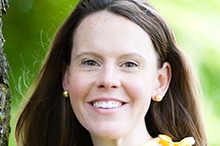
Melissa Broome is being honored as a Working Family Champion of Change
It’s an all too familiar story understood by every working parent. In the wee hours of the morning, you’re jolted awake by the sound of cries on the baby monitor. Sleep deprivation is often an uninvited friend, but this time is different. The crying is different. Something is wrong.
We’ve all been there.
For me, it was an October morning. My baby girl was not quite 18-months-old. When I went in to get her, she was clammy with fever and had thrown up in her crib. I knew right away I wouldn’t be going into the office that day. I made the choice to stay home, and thank God that I did.
In a matter of hours, my daughter’s fever spiked dramatically, leading to a febrile seizure. She was in my arms when the seizure happened. She was in my arms during that terrifying ambulance ride to the hospital. She was in my arms when the doctors eventually assured me that she was going to be OK.
Nothing can prepare you for the excruciating moments of terror that come when your child faces a health emergency. Yet, looking back on that day, I know that I am one of the lucky ones. My ample supply of paid sick days meant that I didn’t think twice about staying home with my daughter.
For too many working parents across our great nation, this is not the case. When I juxtapose my experience with the experience of moms like Monica in Seattle, I am struck by the similarities and haunted by the differences. Immediately after Monica’s youngest son spiked a fever that led to a seizure, she had to decide to report to work or deal with the repercussions of not getting paid. Her choice was one that no parent should have to make.
Stories like Monica’s are happening across our country every day. Hardworking moms and dads have to choose between staying home with their sick children and earning the income they need to keep their families afloat.
In 2015, we know that in the majority of our country’s households, both parents are working outside the home. And yet, our public policies continue to reflect a 1960s mentality. We remain the only industrialized country in the world that doesn’t guarantee workers the ability to earn paid sick days. Forty percent of American workers – more than 43 million people – are denied this basic workplace protection.
In my home state of Maryland, more than 700,000 workers are unable to earn a single paid sick day. We launched Working Matters: The Maryland Campaign for Paid Sick Days in 2012. Since then, we have grown to become a powerful statewide coalition of more than 135 businesses, organizations and faith groups committed to passing the Maryland Healthy Working Families Act. The legislation, which was cosponsored this year by nearly 100 members of the Maryland General Assembly, would allow workers to earn up to seven paid sick days per year.
While there are many political issues that divide the American people, we are undoubtedly united by an innate desire to care for our families. Thankfully for Monica, Seattle passed a paid sick days ordinance in 2011. Policymakers in Maryland – and throughout the country – need to follow suit.
Melissa Broome is acting executive director of the Job Opportunities Task Force (JOTF) where she helps to lead Working Matters: The Maryland Campaign for Paid Sick Days.
Learn more aboutTaking Risks in the Name of Change
Posted by on March 30, 2015 at 11:42 AM EST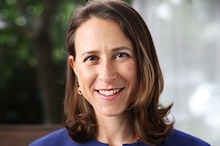
Anne Wojcicki is being honored as a Champion of Change in the Fight Against Parkinson's Disease.
I am humbled to be named one of the White House Champions of Change and to be in the company of such luminaries in the quest to conquer Parkinson’s.
Taking risks in the name of change is important, especially in health care.
I co-founded 23andMe with the belief that the combination of science, social media and you, the consumer, could change research and ultimately create new paths for treatment and prevention. In a short time we have built what is now the world’s largest community of genotyped Parkinson’s patients. This has allowed researchers to discover dozens of new genetic associations for Parkinson’s, and helped give scientists new insight into the disease .Our researchers are investigating not just the genetics that increases one’s risk for Parkinson’s, but what genetic variants may be protective against the disease. We have partnered with non-profit organizations, academic researchers and pharmaceutical companies all in a multi-front effort to make breakthroughs.
I am most inspired by the members of our Parkinson’s research community. They contribute something far more valuable than money: information about themselves. By enabling individuals to come together and share their genetic information and information about themselves, we have the opportunity to make new discoveries and cures at a much faster pace. This is what most excites me about the novel research platform 23andMe pioneered.
Directly involving consumers in researchers is new, and what we have learned is that people are eager to participate in research. Sometimes the best of humanity comes out when we are sick; no one wants to see another suffer in illness. When 23andMe asks people for information about themselves to contribute to research on disease, we see significant participation. So what I have learned after eight years is that there is incredible opportunity before us to gather enough knowledge from the community that we can transform our understanding of health and disease.
My own family has a genetic risk for Parkinson’s, so this mission is personal. Discovering how to prevent or how to treat Parkinson's disease is important for my family and my children. I don’t want to wait for the system to come up with an answer. I want to be part of the solution.
I want to thank the 600,000+ individuals who are currently participating in 23andMe research. They have helped power breakthrough discoveries in Parkinson’s and other diseases. That is incredibly important to me, and hopefully the information I have contributed about me will power the discoveries that help the disease research that is incredibly important to you. We’re all in this together.
Anne Wojcicki, CEO of 23andMe, helped co-found the direct to consumer genetics testing company in 2006 after a decade spent investing in healthcare. 23andMe has built one of the world’s largest databases of individual genetic information.
Learn more aboutMaking a Difference through Parkinson’s Education, Advocacy and Clinical Trials
Posted by on March 30, 2015 at 10:56 AM EST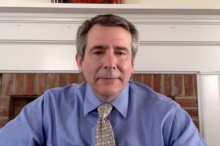
Steven DeWitte is being honored as a Champion of Change in the Fight Against Parkinson's Disease.
It was March 5, 2005, I heard the chilling words, “I’m relatively certain you have Parkinson’s disease.” I was totally ignorant of the implications, and if not for the solemn delivery, I would not have viewed this news as serious. I slowly began my self-education, initially through Google and chat rooms.
Serious education began at the inaugural World Parkinson’s Congress, which revealed how the disease progresses over time, and exposed me to great people who deserved a better quality of life. I was inspired by fellow People with Parkinson’s (PWP) such as Robledo and Issacs. They showed me that patient advocates could have a broad reach and encouraged my drive for positive change.
I started my first support group in October 2006 with eight attendees. The group’s reputation grew, leading to the founding of the Connecticut Advocates for Parkinson's Inc. With names like Hespelers, Baldwins, Pelchat, and Johnson, it has evolved into a collaboration of three State Advocacy Groups named the Make a Difference Parkinson’s Alliance (MADPA), which serves over 300 PWP.
With this foundation, we began to understand and seek opportunities to make a difference, through education, advocacy, and participation in clinical trials:
Education: Patients need to understand the progressive nature of the disease and stay current with treatment options. Sharing their knowledge with others helps the Parkinson community to assess treatments effectiveness and it encourages others to “make a difference.”
Advocacy: There is no stronger influence for change, than sharing patient experiences with elected officials who can drive change through research funding and the appropriate support for regulatory authorities.
Participating in Clinical Trials: It takes over fifteen years and at least $1 billion to bring a symptom-relieving drug to market. Clinical trials are a vital step in this process and require a sufficient number of patients in to the various stages of the clinical trials. Accelerating the recruitment and enrollment of volunteers can have a direct impact on the time and cost to develop advance treatments for Parkinson’s disease.
I discovered two major obstacles to participation in clinical trials was access and fear. PWP were more willing to participate in Clinical Trials than the statistics represented, so I built a database of patients who would participate in trials if transportation were provided. Registrants increased, when they knew others would accompany them, thus eliminating some of the fears. From this, the Clinical Trial Transportation Program (CTTP) was created.
The Program demonstrated its effectiveness in several ways:
- The Program provides a list of pre-screened volunteers that dramatically reduces overall recruitment time.
- Trial results were accelerated, thus speeding data that can be used toward treatment-based research.
- The trial pool attributable to the CTTP lived over 100 miles from the Research Center. Volunteers through the CTTP are a new demographic for most studies.
- By reducing the time it takes to gather the data, there can be cost savings.
Since the program’s first trip to Boston with seven people on July 15, 2011, it has now logged over 100 patient visits at such institutions as Columbia Medical Center, Beth Israel Deaconess, and Weill Cornell.
This journey has brought me many good friends, which has increased my urgency to beat this disease. Through it, we have learned that patients of any disease can be empowered to make a difference, and are important partners in the development of disease modifying treatments.
I am truly humbled to be recognized as a White House Champion for Change, but share this honor with the many before me, and those currently, who are “making a difference” towards finding a cure for Parkinson’s.
Steven DeWitte is the founder and co-chairman for the Connecticut Advocates for Parkinson’s (CAP) and its affiliate organization, the Make A Difference Parkinson’s Alliance (MADPA)
Learn more aboutUsing Technology to Give People with Parkinson’s Specialized Care
Posted by on March 30, 2015 at 10:51 AM EST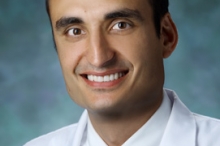
Dr. Ray Dorsey is being honored as a Champion of Change in the Fight Against Parkinson's Disease.
The burden of Parkinson’s disease is increasing rapidly both domestically and globally. Over the next generation, the number of people with Parkinson’s disease will almost double. However, many individuals with Parkinson’s disease lack access to care due to distance and disability. In the U.S., over 40 percent of Medicare beneficiaries with Parkinson’s disease do not see a neurologist and those that do not are 20 percent more likely to fracture a hip, 20 percent more likely to be placed into a skilled nursing facility, and 20 percent more likely to die. To increase access to care, we are using simple video calls to connect Parkinson’s specialists directly to patients in their homes. These virtual house calls offer patients the care they need, the convenience they want, and the comfort they deserve.
With generous support from the National Parkinson Foundation, Patient-Centered Outcomes Research Institute, Parkinson’s Action Network, and our technology partners, we are conducting the first national random controlled trial of telemedicine for Parkinson’s disease. In addition, with generous support from Davis Phinney and his foundation, and Drs. Michael Okun, Carlie Tanner, and Kevin Biglan, we have developed Race-PD which offers 250 individuals across the country the opportunity to connect with Parkinson’s disease specialists for free. We hope that these efforts will help remove barriers for this care model, including arcane licensing requirements and absent Medicare reimbursement. Our vision is to enable anyone anywhere with Parkinson’s disease to receive care.
We also want to enable anyone anywhere with Parkinson’s disease to participate in research. With unprecedented support from Apple, creative geniuses like the mathematician Dr. Max Little, and outstanding partners such as Sage Bionetworks and The Michael J. Fox Foundation, mPower was released on March 9, 2015. A smartphone application designed specifically for Parkinson’s disease research, mPower allows individuals with Parkinson’s disease to track their symptoms in real time, share this information with researchers, and receive immediate feedback for themselves. While not perfect, mPower provides a platform for greater future efforts, including the hope to connect more people to care.
Dr. Ray Dorsey is the David M. Levy Professor of Neurology and Director of CHET at the University of Rochester. Dr. Dorsey is helping investigate new treatments for movement disorders and improve the way care is delivered for individuals with Parkinson’s disease and other neurological disorders.
Learn more about
- &lsaquo previous
- …
- 4
- 5
- 6
- 7
- 8
- 9
- 10
- 11
- 12
- …
- next &rsaquo

